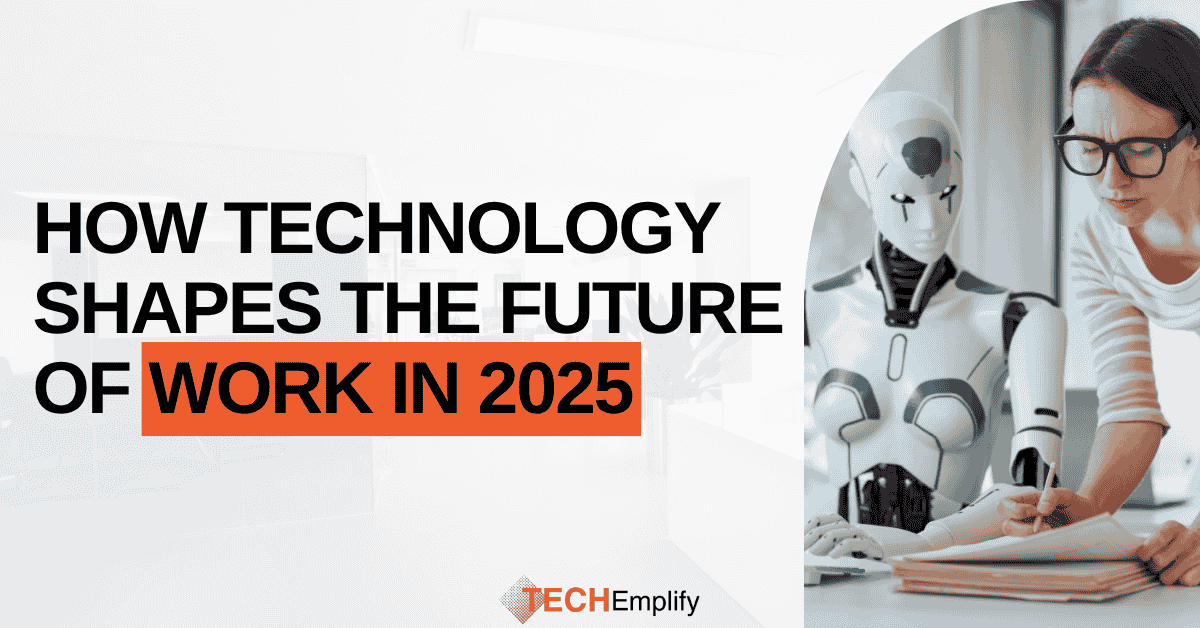Work is changing fast. Technology is the reason for this change. In 2025, tools like AI, remote systems, and immersive tech are reshaping how and where we work. This blog explains it in simple words.
1. The Rise of AI Tools at Work
AI tools are now part of our life in every field of work:
- Famous tools like ChatGPT, Copilot, Gemini and Notion AI help with tasks like writing, summarizing, and brainstorming.
- From July 2025, over 800 million people are using ChatGPT weekly. It is in use at 92% of Fortune 500 companies, up from 80% in 2023. (Reference Azumo)
- Workers who are doing work from home are benefiting too. 60% now use AI tools for work. (Reference CareerWhizz)
- Research shows consultants are using AI to complete tasks 25% faster
AI is not just faster, it helps workers be more creative and accurate.
2. Hybrid Work and Team Flexibility
Remote and hybrid models are now the normal:
- In 2025, prefer remote or hybrid work. It helps reduce turnover and maintain 78% of employee satisfaction.
- Remote workers are 35% to 40% more productive and feel less stressed.
- Companies like Panasonic are building better hybrid workplaces with advanced tech. For example, the AW-UE160 PTZ camera provides auto framing and crisp video for both remote and in office participants.
- Still, some companies like Microsoft are planning tighter return to office rules by 2026, requiring more in-office days per week. (Reference from Business Insider)
Technology is making it possible to work effectively from anywhere, but companies and teams are still figuring out the balance.
3. Immersive Tech and Spatial Computing
Virtual Reality, Augmented Reality, and Mixed Reality are changing how we work:
- These tools let workers interact with digital environments in a real, physical way perfect for design, training, and collaboration.
- Companies use AR to help engineers assemble complex equipment and train staff using virtual simulations.
- Empathy driven remote work is on the rise, a study shows Agentic AI, AI tools that can act proactively to solve problems, not just wait for commands.
This tech helps teams work together more naturally, even if they are not together in person.
4. Remote Work, Gig Economy, and Flexibility
The nature of work itself is evolving:
- Remote work has grown 160% since 2019. It is here to stay.
- By 2025, half of remote workers will be freelancers or gig workers.
- This brings more flexibility, but also concerns about job security and benefits.
Freedom is rising, but so is the need for new worker protections.
5. New Skills and Learning for the Future
New tech needs new skills:
- In 2025, 46% of companies offer internal AI training programs.
- Over 58 million people earned AI related certificates around the world in 2025. (Research SQ Magazine)
- Online learning platforms like Coursera and LinkedIn Learning are seeing huge demand.
- As AI automation grows, new human skills are in demand, digital literacy, creativity, emotional intelligence, and ethics.
Workers and companies both need to learn and adapt fast.
6. A More Human Centered Workplace
Technology is not just about efficiency, it’s about well being.
- In the U.S., 71% of workers are anxious about AI’s impact on job security.
- Still, Advancement in AI Technology can help make work easier. It handles repetitive tasks, giving humans space for meaningful work.
- Many Gen Z and Millennials want more purpose and fairness at work. Tech tools need to support that.
AI tools that free people up to do creative, satisfying work are what matter most.
7. AI’s Job Impact Disruption and Opportunity
AI is not just replacing jobs, it’s changing them and creating new ones.
- A World Economic Forum report found 41% of companies plan to reduce staff due to automation, but 77% are investing in giving new skills between 2025 to 2030.
- In 2025, AI displaced 85 million jobs, but created 97 million new roles, especially in sectors like logistics, healthcare, and finance. (Research From SQ Magazine)
Change is happening fast but it does not only take jobs away it also opens doors.
8. Leadership in the Era of AI
Smart leadership matters now more than ever.
- SAP’s CEO says: AI boosts productivity, but human judgment, empathy, and trust can’t be replaced. Roles like data strategy and digital leadership are growing.
- In India, big IT firms like Infosys and TCS are investing heavily in AI, yet still face growth challenges and some job cuts.
Human involvement remains essential even in a tech heavy world.
9. The Impact of AI on Social Broadly
AI brings big promise, but also big questions:
- A recent Time magazine essay warns about unchecked AI growth. It could replace jobs in law, marketing, and other white collar areas. But with proactive policy and worker input, AI could benefit society instead.
- New automation in maritime industries shows how remote work can improve safety and efficiency. For example, pilots can now guide ships from shore using remote systems.
We need strategy and foresight to make tech work for everyone.
10. Fast Facts Summary
| Tech Trend | Key Impact in 2025 |
| AI Tools | Widespread use; major time savings and productivity |
| Hybrid & Remote Work | Standard models; high employee satisfaction |
| Immersive Tech & VR/AR | Better training and collaboration |
| Gig Economy Growth | Half of remote workers are freelancers |
| Reskilling Programs | Tens of millions upskilling for AI jobs |
| AI Job Displacement & Growth | Jobs lost and faster net gains in new roles |
| Human-Centric Leadership | Focus on empathy, ethics, and strategic thinking |
| Social Concerns | Need for policy and fairness in AI adoption |
Conclusion
In 2025, work is being changed. We can look at AI and digital tools in our surroundings. Remote and hybrid models are normal. Access to immersive tech and upgrade skills is growing. Jobs are changing, but not going anywhere. And most important, success depends on blending technology with human judgment, fairness, and purpose.




